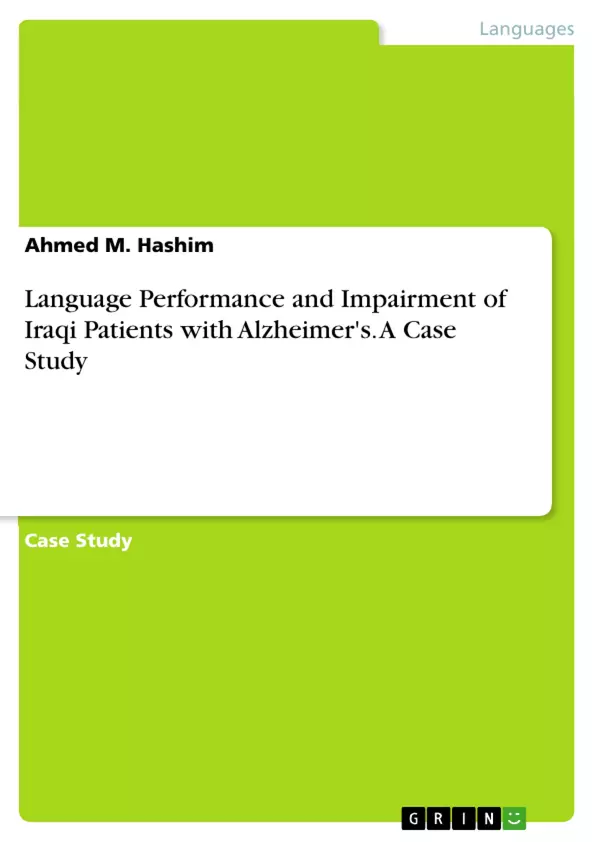This study intends to investigate language performance and impairment elicited in the speech sample of some Iraqi patients diagnosed with Alzheimer’s. The aim of this study is to see whether Alzheimer’s disease affects patients’ language, and if so, what areas of language it affects. In addition, it inspects and explains both language performance and impairment of Alzheimer’s patients during the disease.
It is hypothesized that Alzheimer’s patients suffer from sound substitution and omission on the phonological level, that the patients’ language is affected on both the denotative and connotative sides, that the patients break the rules of turn taking when they engage in conversations, and that Alzheimer’s patients then suffer from language impairment in these areas. The prominent outcome of this study is that Alzheimer’s patients suffer from language impairment in the phonological, semantic, and pragmatic areas of language.
Inhaltsverzeichnis (Table of Contents)
- Introduction
- Alzheimer's disease as linguistic disturbance
- The Mild Phase
- The Moderate Phase
- The Severe Phase
- Research methodology
- Model of the study
- The Selection of informants
- Data collection techniques
- Data analysis and discussion
- Conclusion
- Acknowledgements
- References
Zielsetzung und Themenschwerpunkte (Objectives and Key Themes)
This case study aims to investigate the language performance and impairment of Iraqi patients diagnosed with Alzheimer's disease. The study examines how Alzheimer's disease affects language abilities and identifies specific areas of language affected by the disease. The study explores both language performance and impairment during the progression of Alzheimer's disease.
- The impact of Alzheimer's disease on language abilities, particularly in phonological, semantic, and pragmatic areas.
- The progression of language impairment across different phases of Alzheimer's disease.
- Specific language deficits observed in Alzheimer's patients, such as sound substitution and omission, difficulties with word finding, and pragmatic impairments.
- The use of an eclectic model for data analysis, focusing on phonology, semantics, and pragmatics.
- The application of various research methodologies, including indirect structured interviews and naming tests.
Zusammenfassung der Kapitel (Chapter Summaries)
- Introduction: This chapter provides an overview of Alzheimer's disease, highlighting its impact on memory, cognition, and overall brain function. It discusses the progressive nature of the disease and its effects on various cognitive areas, including language.
- Alzheimer's disease as linguistic disturbance: This chapter delves into the specific linguistic impairments observed in Alzheimer's patients across different phases of the disease. It examines language production, comprehension, and pragmatic aspects, outlining the challenges faced by patients in these areas.
- Research methodology: This chapter outlines the research methodology employed in the study, including the model of data analysis, the selection of participants, and the data collection techniques used. It provides details on the eclectic model, the participant characteristics, and the methods of data collection.
Schlüsselwörter (Keywords)
The study focuses on Alzheimer's disease, language impairment, phonology, semantics, pragmatics, indirect structured interviews, naming tests, and the impact of the disease on the cognitive abilities of patients.
How does Alzheimer's disease affect language performance?
Alzheimer's leads to significant impairments in phonology (sound errors), semantics (word meaning), and pragmatics (social use of language).
What are common phonological symptoms in AD patients?
Patients often suffer from sound substitution and omission, making their speech less clear or incorrect at the sound level.
How does the disease impact social conversation?
Patients frequently break the rules of turn-taking during conversations, which is a key pragmatic impairment identified in the study.
What linguistic differences are seen in different AD phases?
The study differentiates between the mild, moderate, and severe phases, showing that linguistic disturbance increases as the disease progresses.
What research methods were used for the Iraqi case study?
The researchers utilized an eclectic model involving indirect structured interviews and naming tests to analyze the patients' speech samples.



